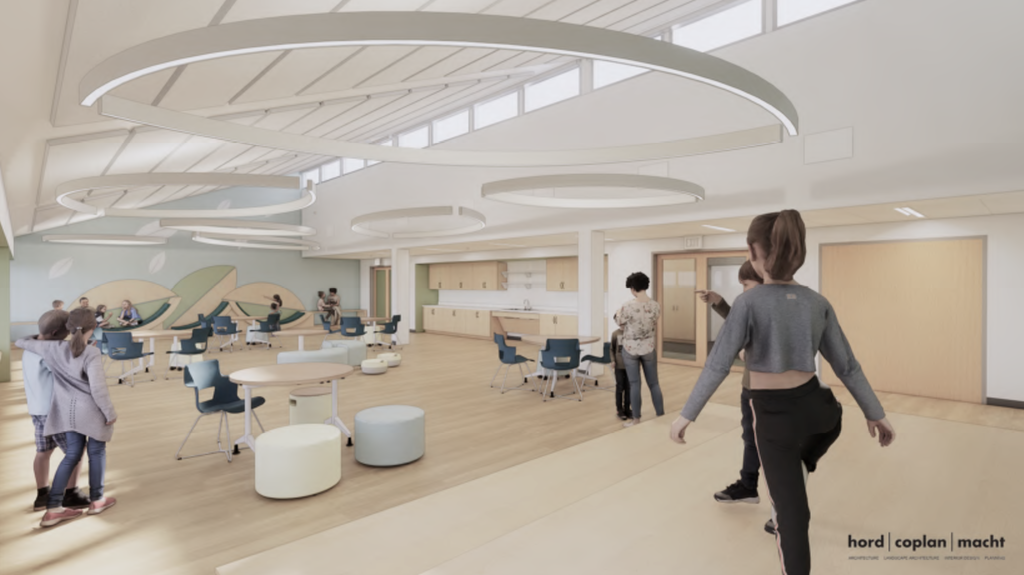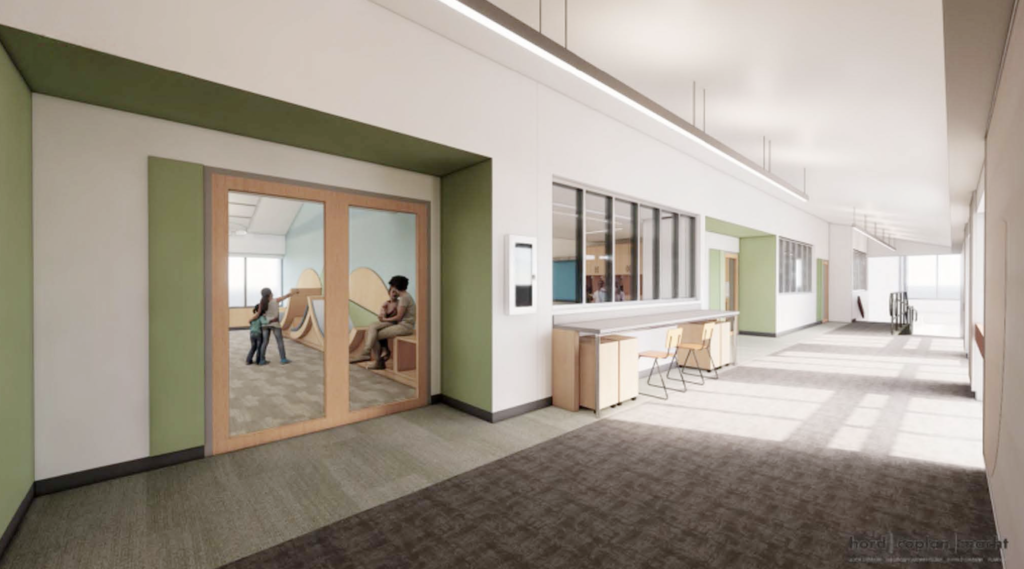Mathematics
We believe that inquiry and the construction of knowledge are essential elements of each student’s educational experience. Park’s mathematics program provides opportunities for students to become more mathematically aware, capable, and confident.
Mathematics enables students to develop a better understanding of our world, to create and discover patterns and ideas, and to appreciate a compelling form of inquiry and argument. Making connections between different areas of mathematics is a major component of our department’s program. We believe the study of mathematics is a unified body of knowledge that emphasizes problem solving and generalization. Applications will engage students and promote their ability to communicate and reason mathematically.
To these ends, all Park students take courses that allow them to become better problem-solvers. Students learn algebra, geometry, trigonometry, and other topics through a discovery process and are routinely expected to apply these concepts in novel situations.
Requirements
Two years of mathematics are required for graduation. However, most Park students study mathematics for all four of their years in the Upper School. Students cover the material on the SAT by spring semester of junior year.
Students are placed in appropriate mathematics classes by the mathematics department and are encouraged to visit the Mathematics/Science Office for assistance from faculty members at any time; peer tutors are also available.
A scientific calculator is required for all mathematics classes. Only Calculus (Accelerated), Advanced Calculus (Accelerated), and Statistics (Accelerated) require students to have a calculator. The current recommendation of the department is the TI-30XS MultiView scientific calculator.
Note: Our goal is for students to take the math courses most appropriate for them. Each level within the core curriculum in Grades 9, 10, and 11 will appear as Math 9, Math 10, and Math 11 on student transcripts. Our most difficult Math 10 and Math 11 courses are exceptions, in which students’ classes will be marked as accelerated.
Math 9
Grade 9 • Required
This course is required at one of four levels: Math 9-1, Math 9-2, Math 9-3, or Math 9-4.
Math 9-1
Grade: 9
This course explores advanced algebraic and geometric content through an emphasis on problem solving, flexible reasoning, and formal proof. Topics include graph theory, laws of exponents and radicals, the algebra of rational expressions, quadratic equations, Euclidean and coordinate geometry, and unit-circle trigonometry.
Math 9-2, Math 9-3, and Math 9-4
Grade: 9
These courses explore algebra, geometry, and the connections between the two, with an emphasis on developing students’ ability to solve problems through a variety of approaches. Topics include algebra, coordinate geometry, systems of equations, trigonometry, quadratic functions, and combinatorics, with a consistent focus throughout on reasoning and proof.
Math 10
Grade 10 • Required
This course is required at one of four levels: Math 10-1, Math 10-2, Math 10-3, or Math 10-4.
Math 10-1 (Accelerated)
Grade: 10
Students expand upon the understanding of algebra and geometry gained in Math 9-1. They explore exponential and logarithmic functions, combinatorics, sequences and series, graphical transformations, polynomials and rational functions, circular motion and the trigonometric functions, trigonometric identities, complex numbers, and begin the study of infinitesimal processes.
Math 10-2, Math 10-3, and Math 10-4
Grade: 10
These courses examine algebra, geometry, and discrete mathematics, but in greater depth than the previous year, with a continuing emphasis on developing students’ ability to solve problems through a variety of approaches. Topics may include graph theory, geometric sequences and series, radicals and laws of exponents, the algebra of rational expressions, exponential functions, further study of quadratic equations, polynomial functions and complex numbers, statistics, and Euclidean geometry.
Math 11-2 (Accelerated), Math 11-3, and Math 11-4
Grade: 11
These courses emphasize applications of mathematics and may include the following areas: algorithms, exponential functions, logarithms, trigonometric functions, transformations of functions, polynomial functions, trigonometric identities, combinatorics and probability, and further topics in geometry.
Calculus (Accelerated)
Grades: 11-12 • Prerequisite: Math 10-1 or permission of current math teacher.
Concepts and applications of differential and integral calculus are presented. For juniors, a month-long final project, requiring considerable independent work, concludes the course. Students who complete the course successfully are prepared to take the Advanced Placement Calculus AB exam.
Advanced Calculus (Accelerated)
Grade: 12 • Prerequisite: Calculus
In Calculus, students are introduced to the concept of limits, and learn how they can be applied to develop the theory of differentiation (rates of change) and integration (accumulation), which culminates with the fundamental theorems of calculus. Advanced Calculus further develops the techniques of differentiation and integration, and serves as a foundation for classes like differential equations, multivariable calculus, and linear algebra. The curriculum is designed to include the following: indeterminate forms; logarithmic and implicit differentiation; related rates; integration by parts; partial fraction decomposition; improper integrals; parametric and polar equations; vector calculus as it applies to position, velocity, and acceleration; differential equations and population models; sequences; Taylor and power series. These topics cover all of the material found on the Advanced Placement (AP) Calculus BC exam, and will provide a strong foundation for students interested in taking the test.
Group Theory: An Introduction to Abstract Algebra (Accelerated)
Grades: 10-12
Abstract Algebra is the study of algebraic structures. This includes the basic algebra you started learning in Middle School (i.e., the rules of manipulating real numbers), but can be expanded to matrices, isometries, permutations, polynomials, symmetries, complex numbers, and functions in general. In this class, students will study the general algebraic structures known as groups, building up theorems from a single abstract definition. They will explore many particular examples of finite groups and come to understand certain rules governing their structure, as well as see some applications of these groups to the sciences (in fields including crystallography, molecular symmetry, and encryption), and to general mathematical problem solving (how many different Rubik’s cube configurations are there?). This is a reading and writing intensive class! Students will be expected to read mathematical writing from the textbook, and problem sets and exams will include proofs — creating a written, logically sound argument in mathematical English.
Statistics (Accelerated)
Grades 10-12
This yearlong course begins by using statistical tools to collect and describe data. In particular, students learn to describe distributions using measures of center, shape, and variability, analyze two-variable statistics, learn survey design and the biases that can come up, and learn good practices for designing experiments. Students then study probability, random variables, and related concepts to provide the theoretical grounding for statistical inference. Finally, they study sampling distributions and learn a variety of ways to test for statistical significance. This course is designed to prepare students for the AP Statistics exam. Students should be willing to keep up with a fixed syllabus and, if taking the exam, to put in some extra work in April and May.
Calculus 1
Grade: 12 • Prerequisite: Math 11-2 or permission of the department.
Calculus 1 is the first course in the ideas of differential calculus. Students will begin the course by considering the “tangent line problem” and go on to study limits and develop a definition of the derivative. Students will then learn to interpret the derivative in context and explore ideas of continuity and differentiability, understanding when derivatives do and do not exist. Before applying the derivative to real-life problems, students will learn a variety of techniques for taking derivatives of advanced functions while strengthening their skills with algebra and modeling physical and social phenomena using mathematical functions. In this college preparatory course, entering students are expected to be comfortable with interpreting and graphing functions and have strong algebra skills.
Discrete Mathematics 1
Grades: 10-12
Discrete Mathematics is a contemporary branch of mathematics that focuses on various problems, topics, and algorithms that often have whole-number outcomes. The topics are grounded in real applications. This course focuses on the mathematical perspective of fairness, value, and individual perception. Students study a wide variety of voting methods and examine “fair division” algorithms through the lens of entitlement to estates, apportionment for governing bodies, and an array of continuous cases.
Statistics 1
Grades: 10-12
Students study topics in descriptive statistics: displaying data, describing data sets according to center, shape, and spread, correlation, experimental design, sampling techniques, sampling bias, and probability.
Calculus 2
Grade: 12 • Prerequisite: Calculus 1
In Calculus 2 students will continue to use the lens of calculus to study functions and their graphs. Building on the concept of the limit, the course opens by studying the “area problem” and using Riemann Sums to approximate areas under curves. After considering applications of Riemann Sums, students will learn the definition of the definite integral and will practice with antiderivatives in preparation for proving the Fundamental Theorem of Calculus. Once the FTC is proven, the course concludes with a survey of some common applications of integration.
Discrete Mathematics 2
Grades: 10-12
Discrete Mathematics 2 will focus primarily on financial applications and data analysis. The class will begin with a study of interest rates and how interest develops over time (including discussions of APR, APY, and deferred annuities and installment loans). Then students will closely analyze and create data displays. (Note: Discrete Mathematics 1 is not a prerequisite.)
Statistics 2
Grades: 11-12 • Prerequisite: Statistics 1
Topics may include the normal distribution, sampling distributions, conditional probability, confidence intervals, hypothesis testing, and expected value. Note that Statistics 1 is a prerequisite for this course.





